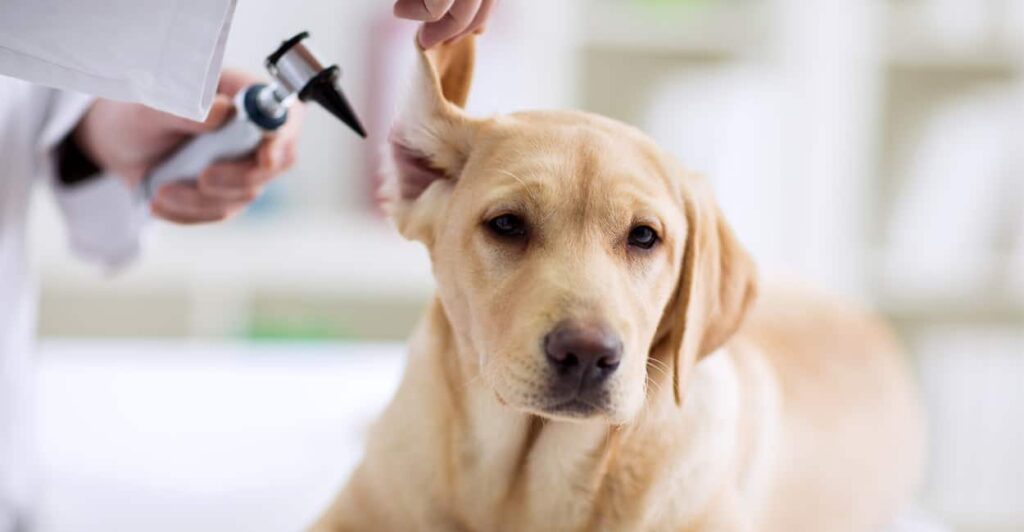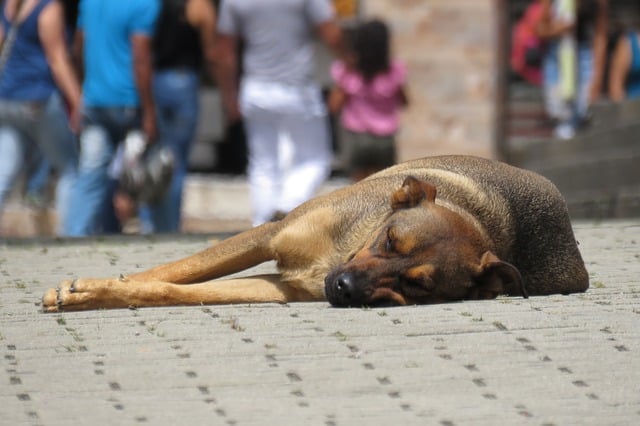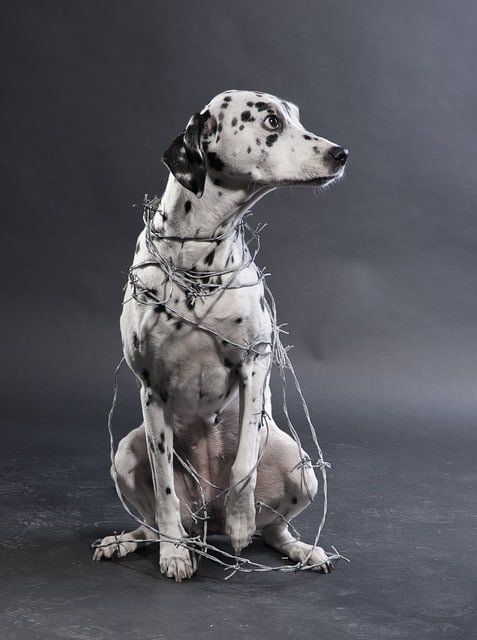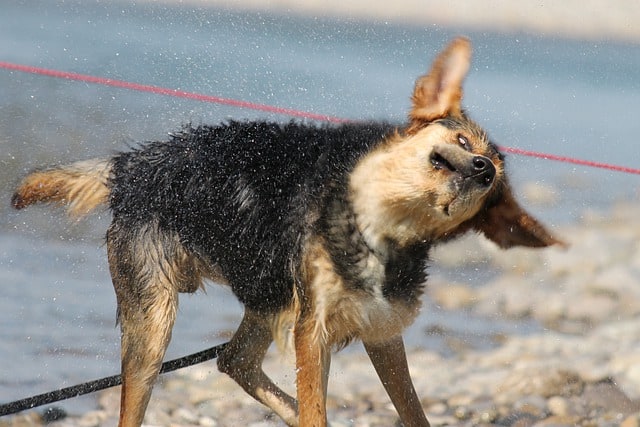Dogs are some of the most flexible pets on earth. Granted, they don’t compare to cats in that department but they can flex their muscles quite well.
So, when playing fetch or Frisbee with your doggie, you might have noticed that she can jump high and catch a ball.
Sometimes she throws her head way back to grasp a flying toy or something that interests her.
If this happens from time to time, you have no reason to panic. Head jerking is quite normal in the canine world.
On the other hand, a pooch that throws her head backward repeatedly may indicate a problem.
You can tell things are not normal if your pet exhibits this behavior at random.
Even without flies to bite, she will look up in the air and push her head as far back as possible.
Sometimes she would be peacefully resting only for her to sit up and begin jerking her head.
In such a case, your dog may need help. Here, we have detailed 5 reasons dogs throw their heads backward and what to do about it.
1. Canine Otitis And Ear Infections

Canine otitis is a fancy word for the inflammation of the external ear canal in dogs. This occurs when the cells that line the outer layer of the ear canal are inflamed.
The shape of the ear canal or pinnae predisposes dogs to infections. It makes it easy for parasites, allergies, and foreign objects to thrive in them.
Yeast, bacteria, and middle ear infections can also cause otitis.
The common symptoms of canine otitis include shaking of the head, redness of the skin, scaly skin, and the presence of ear discharge.
Dogs tilt their heads to ease pain or offer some relief from itching.
To know whether your dog is moving her head backward because of ear infections or otitis, you will have to check for the other symptoms mentioned.
If the ear is inflamed, red, or has some sort of discharge/odor along throwing the head back, she may have the condition.
What to Do
Canine otitis and ear infections require medical help. If left untreated, inflammation may cause permanent damage to the ear.
In worse situations, this may affect the hearing of the doggie if it tampers with the structure of the ear.
The best thing to do would be to take a trip to the vet. Let them do thorough tests on the dog and offer the necessary remedies.
Related Post: 10 Best Dog Ear Cleaners for Yeast
2. Neurological Issues

Besides canine otitis, a dog that moves her head back may be suffering from a neurological disorder.
The most probable cause is seizures. If your dog has already been diagnosed with seizures, she is likely to jolt her head occasionally.
The condition is an involuntary disturbance of the brain’s normal function.
It is often accompanied by a muscle activity that the dog cannot control.
Other neurological disorders include epilepsy which refers to repeated seizures.
Most cases of neurological disorders are inherited. This explains why some dogs have it and others don’t.
Other causes are brain tumors, stroke, kidney failure, toxins, liver disease, inflammation of the brain, autoimmune diseases in the brain or spinal cord, and brain trauma.
After a seizure, your dog will not have control over her muscles for a few minutes.
This is when you may notice her moving her head backward among other bizarre movements.
What to Do
When you catch your dog seizing, shaking her head, pressing it on a surface, moving it back, circling, acting disoriented, or being unable to use one or both limbs, call the vet.
Some neurological disorders can be treated. Those that are permanent can also be managed to give your dog a good quality of life.
Related Post: Why is My Dog Shaking Head after Ear Plucking?
3. Myoclonus
Myoclonus or muscle contraction disease is a type of condition where a muscle or a group of them contracts in an involuntary, repetitive, and rhythmic manner.
The contractions are a result of a nervous dysfunction triggered by canine distemper, lead poisoning, or drugs.
It is also congenital meaning it affects certain dogs and not others.
According to PetMD, Dalmatians and Labrador retrievers are predisposed to the condition compared to other breeds.
What to Do
The common signs for myoclonus include involuntary, repetitive, and rhythmic motions, especially in the head.
When you see any of these symptoms, contact your vet. They will conduct various tests on the pup including a complete blood count, physical exams, urinalysis, and a biochemistry profile.
In other cases, magnetic resonance imaging (MRI) may be necessary to get to the bottom of the issue.
Luckily, treatment is available for certain causes of myoclonus such as brain inflammation.
However, if the condition is severe, the vet will advise you on how best to manage it.
4. Past Abuse

Some dogs respond to fear by throwing their heads back.
If yours has a phobia of being petted in her head, chances are she was abused in the past.
Perhaps her old owners were in a habit of hitting her in the head.
So, when you move in and try to rub her, her past traumas will resurface.
To be safe, she will move her head backward to avoid being abused again. Sometimes she does that to redirect your hand to her preferred area.
Try petting her back and see what happens. If the pooch doesn’t seem to have a problem with that, you can conclude that she was abused in the past.
What to Do
If you suspect that your fur baby was previously abused, the best thing to do is to assure her that you are not the enemy.
For starters, do not put her in a situation of discomfort. If she doesn’t want to be petted in the head, let her be.
Also, offer stability at the home and let her enjoy her freedom. Try to integrate her into your life by playing with her, showing lots of affection, and giving treats.
If nothing seems to work get a behavioral therapist for the doggie and let them help you.
Related Post: Will My Dog Forgive Me for Hitting Him?
5. Neck/Spinal Problem
Last but not least, a problem in your dog’s spinal cord or neck may cause her to throw her head back.
Cervical stenosis occurs when the spinal canal becomes narrow and presses the spinal cord.
Not only does this compromise the ability of the spinal discs to absorb shock but it causes the ligaments and bones to thicken and become less pliable.
Some of the symptoms of spinal or neck issues include muscle weakness, head jerking, tingling, numbness, and pain.
Dogs with arthritis present with such symptoms as it is caused by wear and tear brought about by the disease.
What to Do
Rush to the vet when your dog shows any of the aforementioned symptoms.
In severe cases, surgery may be required to create space for the spinal cord and nerves.
If left untreated, the condition can cause paralysis, numbness, weakness, incontinence, and balance issues.
See the vet as soon as you can.
Closing Thoughts
While pups sometimes pull the craziest stunts, sometimes the behavior is concerning.
If your doggie cannot stop throwing her cute head back, your best bet is to call the vet.
She may be suffering from any of the mentioned issues and will need your help.
Let the pros determine what the issue is and offer the necessary treatment.
As an Amazon Associate, we may receive a small commission from qualifying purchases but at no extra cost to you. Learn more. Amazon and the Amazon logo are trademarks of Amazon.com, Inc, or its affiliates.

